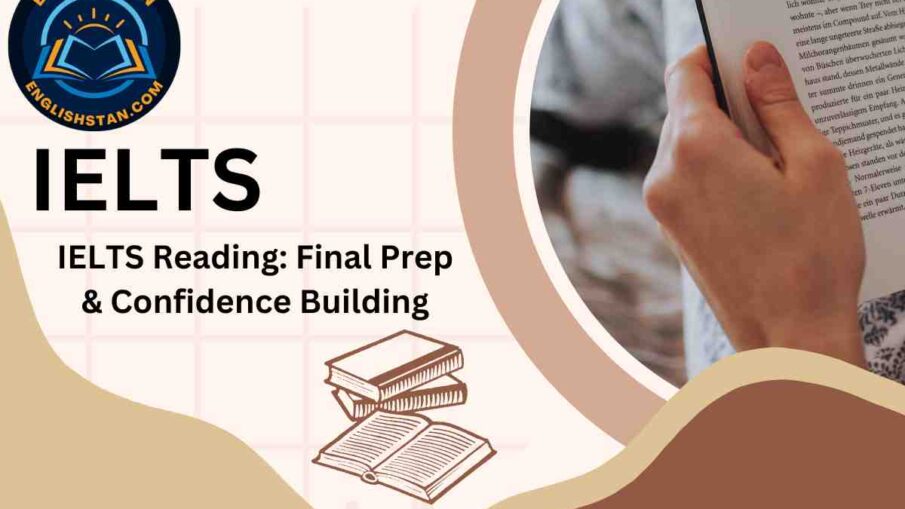IELTS Reading: Final Prep & Confidence Building: “An IELTS reading journey is more than just vocabulary and comprehension; it’s about building the confidence to shine brightly on exam day.”
Understanding the IELTS Reading Section
Introduction to IELTS Reading
IELTS, or the International English Language Testing System, evaluates the English language proficiency of non-native English speakers. The reading section assesses your ability to understand and interpret texts. But what does this section truly entail?
Types of Questions
The IELTS reading section offers a mix of question types from multiple-choice to summary completion. Each type tests a specific skill, from understanding the main idea to identifying the writer’s opinion.
Common Challenges
Common pitfalls for candidates include time mismanagement, unfamiliar vocabulary, or misinterpreting a question. Understanding these challenges is the first step in overcoming them.
Preparation Techniques for IELTS Reading
Building Vocabulary
A robust vocabulary can be your best ally. Regular reading of varied sources and noting down unfamiliar words can help. But remember, understanding context is just as important as knowing the meaning.
Time Management Strategies
The clock is ticking, and every minute counts. Practice with a timer, aim to answer questions faster with each attempt, and keep a few minutes in the end for a quick review.
Practice Regularly
Consistency is key. Allocate a specific time each day for your IELTS reading practice. This hones your skills and builds the stamina you’ll need for the exam.
Boosting Confidence for IELTS Reading
Positive Affirmations
Your mindset can make or break your performance. Start each study session with positive affirmations. Believe in your preparation and your ability to succeed.
Visualization Techniques
Imagine yourself taking the exam. Visualizing success can help reduce anxiety and boost confidence. It’s not just about studying hard; it’s about believing in yourself.
Familiarizing with the Exam Format
The fear of the unknown can be daunting. Familiarize yourself with the IELTS reading format, the types of questions, and the scoring pattern. This reduces surprises on exam day.
SEO-Friendly Tips for IELTS Blogs
Using Relevant Keywords
For your IELTS blog to stand out, incorporate relevant keywords without overstuffing. Remember, SEO is not just about quantity but quality.
Ensuring Quality Content
Your content should provide value. Offer unique insights, tips, and resources that cater to the IELTS reading aspirants.
Engaging with the Audience
End your posts with a question, encourage comments, or ask for feedback. An engaged audience is more likely to return and share your content.
Importance of Regular Practice
Consistency in Practice
The more you practice, the better you get. And with regularity, your comprehension and speed can both see significant improvement.
Variety of Reading Materials
Diversifying your reading materials can aid in understanding different writing styles and broadening your vocabulary.
- Newspapers provide current events and varied topics.
- Magazines offer specialized insights and often more informal language.
- Academic Texts prepare you for the more arduous IELTS reading passages.
Conclusion
Preparing for the IELTS reading section is a journey. With focused preparation, the right strategies, and unwavering confidence, you can ace the reading section and enjoy the learning process. Keep practising, stay confident, and remember that every challenge is an opportunity in disguise.
FAQs
- How long is the IELTS reading section?
- The IELTS reading section is 60 minutes long.
- Is the content different for the Academic and General IELTS reading sections?
- Yes, the Academic test has three long texts, while the General test has shorter texts.
- How many questions are there in the IELTS reading section?
- There are 40 questions in total.
- Can I write on the question paper?
- Yes, but only your answer sheet will be marked.
- Are there penalties for wrong answers?
- No, you won’t lose marks for incorrect answers.
- How can I improve my reading speed?
- Practice regularly, focus on understanding the main idea, and try skimming techniques.
- Are the texts in the IELTS reading section taken from books?
- They can be from books, magazines, newspapers, and online sources.
- Can I use a dictionary during the exam?
- No, dictionaries are not allowed.
- Should I read the questions first or the passage?
- This depends on your strategy. Some prefer to read questions first, while others start with the passage.
- What’s the most critical aspect of IELTS reading preparation?
- Regular practice, understanding the format, and building confidence are all crucial.

Leave a Reply